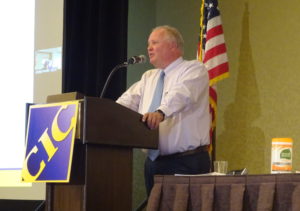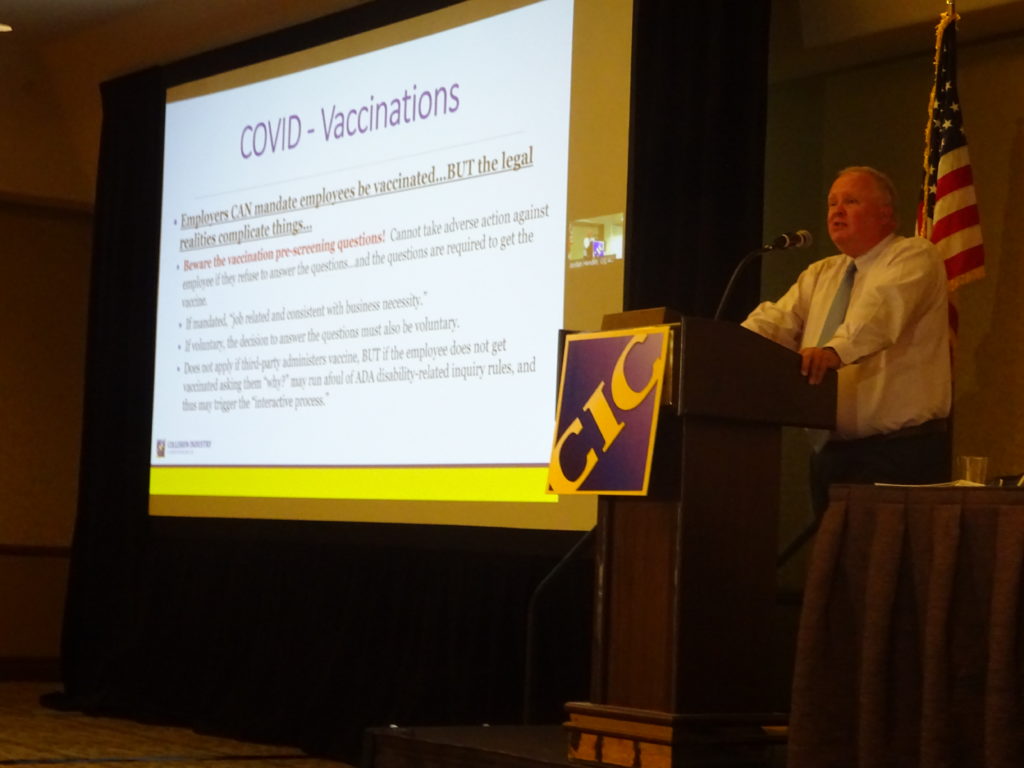
Auto body shop HR attorney: Employers can require COVID-19 vaccines — but tread carefully
By onAnnouncements | Associations | Business Practices | Education | Legal | Repair Operations
Collision industry human resources attorney Cory King last month said body shops and other companies can demand workers receive COVID-19 coronavirus vaccinations. However, the business could find itself in a “pack of trouble” without first educating itself and seeking assistance on the topic, he said.
Which is a good time to bring up our usual caveat: None of the comments and analysis presented here are intended as legal advice; they’re for informational purposes only. Seek qualified counsel licensed in the relevant jurisdiction before taking any action.
“The short answer is: Yes, you can,” King, an attorney at FordHarrison, said of workplace vaccination requirements. But it’s more complicated than that, he told the April 21 Collision Industry Conference. King said they’ve seen “a lot of employers screwing up.”
One of the potential pitfalls lies in the prequalification questioning prior to the vaccination. It’s possible these inquiries could trigger an Americans with Disabilities Act violation — particularly if the employer hosts a vaccination clinic in-house, King warned. The employee is answering a question for the employer, and it’s assumed the employer has access to the answers, he explained.
If the vaccine is strongly encouraged by the business but ultimately voluntary and the questions voluntary, the business might be on safer ground, according to King.
“Pre-vaccination medical screening questions are likely to elicit information about a disability,” the Equal Employment Opportunity Commission wrote in December 2020.” This means that such questions, if asked by the employer or a contractor on the employer’s behalf, are ‘disability-related’ under the ADA. Thus, if the employer requires an employee to receive the vaccination, administered by the employer, the employer must show that these disability-related screening inquiries are ‘job-related and consistent with business necessity.’ To meet this standard, an employer would need to have a reasonable belief, based on objective evidence, that an employee who does not answer the questions and, therefore, does not receive a vaccination, will pose a direct threat to the health or safety of her or himself or others.”
This ADA-question issue isn’t a concern if employees arrange their work-mandated vaccines themselves at third-party locations, such as local drugstores, rather than through an employer-hosted clinic, according to King.
“By contrast, there are two circumstances in which disability-related screening questions can be asked without needing to satisfy the ‘job-related and consistent with business necessity’ requirement,” the EEOC wrote in December 2020. “First, if an employer has offered a vaccination to employees on a voluntary basis (i.e. employees choose whether to be vaccinated), the ADA requires that the employee’s decision to answer pre-screening, disability-related questions also must be voluntary. 42 U.S.C. 12112(d)(4)(B); 29 C.F.R. 1630.14(d). If an employee chooses not to answer these questions, the employer may decline to administer the vaccine but may not retaliate against, intimidate, or threaten the employee for refusing to answer any questions. Second, if an employee receives an employer-required vaccination from a third party that does not have a contract with the employer, such as a pharmacy or other health care provider, the ADA ‘job-related and consistent with business necessity’ restrictions on disability-related inquiries would not apply to the pre-vaccination medical screening questions.”
However, should the employee go out to a third-party location and decline to answer the prescreening questions or are denied the vaccine because of their answers, “you cannot ask them why they did not get vaccinated,” King said. Your inquiry could run afoul of the ADA and have “crossed the line into a place that you do not want to be,” he said.
The company might need to accommodate the worker or give them another opportunity to pursue the vaccine, he said.
A shop might also need to be cognizant of the chance a worker might claim a religious or “sincerely held” belief exemption, something protected by Title VII of the Civil Rights Act. An employer might have to provide reasonable accommodation in such a circumstance.
King said the law is very broad, and employers aren’t allowed to ask the employee whether they sincerely hold a belief. If the employee tells you to “‘go pound sand'” on Title VII grounds, “that is not the time to pick the fight,” King said.
King said he’s encountered numerous instances of employers who recount having told an employee, “‘I don’t care what the religion says'” and not to come back to work. The company felt public health trumped religion.
“Not quite,” King said. In fact, the employee was “probably right,” he said.
Instead, be polite, tell an employee citing a Title VII exemption that you’ll look into it, and call an employment lawyer, King said. The employer could be on “very dangerous ground,” but “you can make it through,” King said.
It’s possible the workplace can claim that accommodating a client would place an undue hardship on an employer, according to King. The EEOC as of Wednesday said the Supreme Court has defined an “undue hardship” worthy of an employer exemption as “more than a de minimis cost.” The agency calls this a lower bar for employers to meet for an accommodation exemption than the “an action requiring significant difficulty or expense” definition within the ADA.
What about other reasons cited by an employee for refusing to be vaccinated, such as caution over side effects or a conspiracy theory?
Fear of the vaccine, for example, “is not going to be a protected category,” King said. But an employer should contact an employment lawyer before firing such an employee or overruling their objection and ordering a vaccine, he indicated.
If the worker’s argument wanders into a protected category, “you must be very, very careful,” King said.
“Social, political, or economic philosophies, as well as mere personal preferences, are not religious beliefs protected by Title VII,” the EEOC states. “However, overlap between a religious and political view does not place it outside the scope of Title VII’s religion protections.”
Many other issues might arise with employers requiring vaccinations besides the ones featured here, according to King. Potential considerations could include organized labor, OSHA regulations and wage and hour policies. We repeat: Consult with a qualified expert before taking action.
As of 6 a.m. Tuesday, 46.2 percent of the population and 58.5 percent of adult Americans (18 years or older) have received at least one vaccine, according to the Centers for Disease Control. The CDC said 35.1 percent of Americans and 44.7 percent of adults are considered fully vaccinated.
More information:
“What You Should Know About COVID-19 and the ADA, the Rehabilitation Act, and Other EEO Laws”
Equal Employment Opportunity Commission, Dec. 16, 2020
Centers for Disease Control COVID-19 vaccine website
Featured images: FordHarrison attorney Cory King at the April 21, 2021, Collision Industry Conference discussed considerations for employers desiring to require COVID-19 vaccines. (John Huetter/Repairer Driven News)

